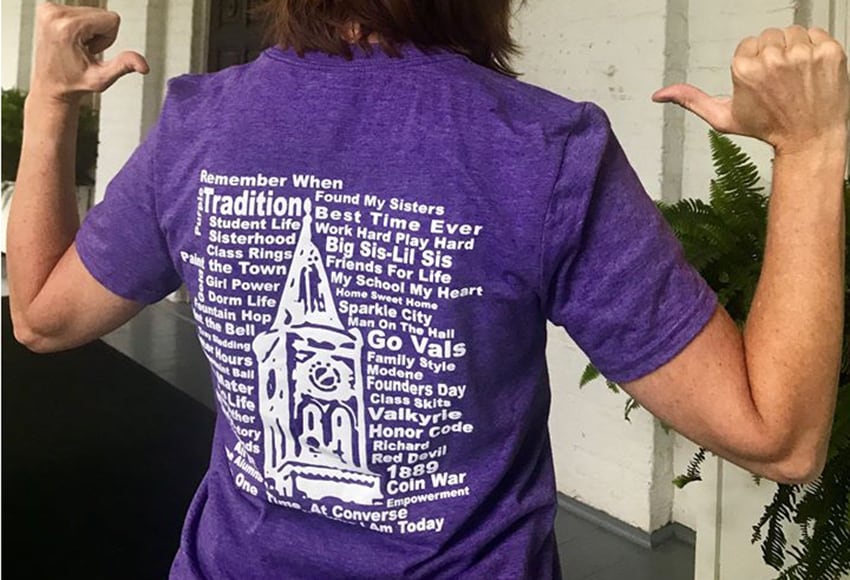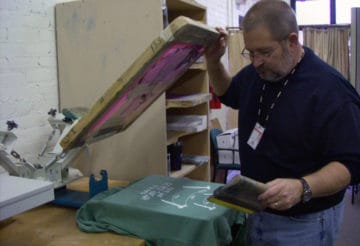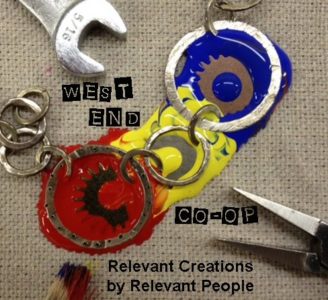Sometimes a T-Shirt is Not Just a T-Shirt…

By Courtney Hammett ’19
T-shirts don’t often cause such a stir, but the 2018 Alumnae Reunion shirt has been a smash hit and, more importantly, stems from a touching story about an alumna and how she helps people recovering from trauma.
The soft purple shirts are a true Converse creation: They were designed by Class of 2018 students Aquarius Lawson and Alex Schlesener and screen-printed by workers at the West End Co-Op in Greenville, SC, a nonprofit extension of the Greenville Health System led by Converse alumna Dr. Kimberly “Kimbo” Bridges.
Patients recovering from a stroke or trauma find joy and meaning in their work.
On one side of the West End Co-Op, brain injury patients do typical rehab activities —“Pick this pen up with chopsticks, put it over there.” On the other side, magic happens. Patients recovering from a stroke or trauma find joy and meaning in their work. Whether creating intricate bracelets for their partners, building the meat smoker of their dreams, or even fixing motorcycles, patients get to escape the tedium of recovery and have something to show for their progress. The three components of the West End Co-Op, which include a storefront where shoppers can purchase unique treasures, are Work Worth Doing, Art of Hope, and Silver Lining Jewelry.
 A client screen prints t-shirts at the West End Co-Op
A client screen prints t-shirts at the West End Co-Op
In pursuit of her BFA in Art, Kimbo Bridges attended Converse expecting to be a “starving artist.” As a student, she found faith and best friends, leading to a passion for service work. Once, she and a friend traveled to Mexico to build houses, and she found a way to incorporate art projects as therapy for that community. Bridges also volunteered for a children’s shelter, working with child survivors of abuse. It was an experience she says she felt led by God to do. Later, she found a paying job at a girls’ home, and while working there she also earned a Master of Divinity to help guide her therapy. In a leap of faith she accepted a deep pay cut for a job opportunity with a hospital, which later led to an opportunity to serve as youth pastor for a local church. While serving in this role, she earned a master’s degree and Ph.D. in Occupational Therapy from Brenau University. “I get the job first, then get educated on whatever I’m doing,” she quips.
Rather than finding a dream job, she created her dream job blending work as an Occupational Therapist, an arts and crafts instructor, a traveling presenter, and an author of a 400-page manual on replicating her innovative techniques with patients. Once she describes the breadth of her career, I ask when she sleeps. She laughs that off and says: “Work is like play. There is no difference.” This career with extensive duties is her “little slice of heaven.” She gushes further about seeing her patients’ work on the walls and seeing their eyes light up when they can do things that matter after trauma. She recounts the story of a workshop she presented a workshop about collaborative art. Each person created a piece of a larger painting, and there was catharsis in depicting their trauma and writing about the good that came out of their struggles. Even the other doctors and professionals were moved to tears.
She tells other moving stories about a patient who had been struck by a car, then made jewelry from the glass in their leg – forgiving the person in the process. A construction worker from Mexico was injured in a hit-and-run. Paralyzed with a wife and two kids, he felt inadequate, as his role had changed from provider to patient. One of his greatest pleasures was fishing, so Dr. Bridges devised a way to fish in his wheelchair off a parking deck. He was “happy as a lark” once he could feed his family and participate in his favorite hobby again.
 This is the essence of her techniques. Bridges says her style of occupational therapy is “asking what the patient wants and doing it.” This is why the co-op purchased a freight container to house the less delicate projects the patients feel called to do. The arts, crafts, and cookie business expanded into a motor repair and woodworking business. In a fully accessible and comfortable environment, people make great progress in recovery while feeling independent and fulfilled. Building something provides tangible proof of that progress, and these projects often get taken home or sold. The Co-Op thrives on referrals for projects like the Converse T-shirts, but the storefront helps keep it going as well, with 100% of profits being returned back to the Co-Op. The patients’ work reaps benefits for themselves and future patients. Then there’s general pledges and donations, like the generous donor who funded the freight container. Bridges’ story as founder and the success she has built are not even present on the website. The focus is on the Co-Op’s therapeutic outcomes, and Bridges says the glory goes to God.
This is the essence of her techniques. Bridges says her style of occupational therapy is “asking what the patient wants and doing it.” This is why the co-op purchased a freight container to house the less delicate projects the patients feel called to do. The arts, crafts, and cookie business expanded into a motor repair and woodworking business. In a fully accessible and comfortable environment, people make great progress in recovery while feeling independent and fulfilled. Building something provides tangible proof of that progress, and these projects often get taken home or sold. The Co-Op thrives on referrals for projects like the Converse T-shirts, but the storefront helps keep it going as well, with 100% of profits being returned back to the Co-Op. The patients’ work reaps benefits for themselves and future patients. Then there’s general pledges and donations, like the generous donor who funded the freight container. Bridges’ story as founder and the success she has built are not even present on the website. The focus is on the Co-Op’s therapeutic outcomes, and Bridges says the glory goes to God.
Kimbo Bridges may be a local hero to the people she’s served in her decades of therapy so far, but she insists that worldly success in the form of awards and invitations to prestigious conferences is not too important to her. What matters is how she impacts others: The Co-Op has served 198 clients served, 54% were male and 46% female, with an average age of 46. These clients include 12 youth between 10-18 years old. Following therapy, 97% of clients required less supervision by caregivers, 100% experienced increased independence, and 83% maintained their abilities after discharge. Customer satisfaction in every area was 96-97%.
Bridges is writing a book in addition to her manual and presentations, so that other professionals have a model to follow. She hopes to encourage more consistency across therapists assigned to patients from emergency rooms to long-term care. She also aims to create a connective tissue between patients and the outside world because, she says, the worst problem for brain injury patients in recovery is isolation.
Bridges still credits Converse College with making her lifelong friends, inspiring her spiritual path and life of service, and cultivating the art skills she uses every day. As her first experience of adulthood, Converse instilled lifelong values that have been present in every additional school or work experience, she says. Her outlook and work demonstrate the value of our liberal arts education.
Sometimes, a T-shirt is not just a T-shirt.
For information on the West End Co-Op, visit WestEndCoOp.com.
ABOUT THE AUTHOR
Courtney Hammett is a Converse II student majoring in English who aims to become a teacher. She works on campus in the Office of Institutional Advancement.